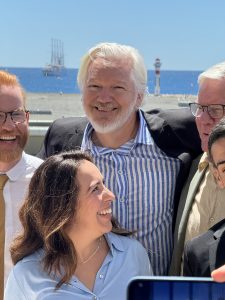Imago, a documentary by Chechen-born filmmaker Déni Oumar Pitsaev, won the L’Oeil d’or prize today, the top award for nonfiction film at the Cannes
Imago, a documentary by Chechen-born filmmaker Déni Oumar Pitsaev, won the L’Oeil d’or prize today, the top award for nonfiction film at the Cannes Film Festival. But it wasn’t the only award presented by the jury. The Six Billion Dollar Man, director Eugene Jarecki’s film about Wikileaks founder Julian Assange, won a Special Jury Prize marking the 10th anniversary of the L’Oeil d’or prize.
Both directors were on hand for the announcement at the Palais des Festivals in Cannes.
“I didn’t expect at all,” Pitsaev told Deadline after receiving the award. He said it might prove challenging to get the metal Golden Eye trophy through airport security. “I hope they will not see it as a weapon. I mean, you can hurt someone with that.”
Wikileaks founder Julian Assange at the Cannes Film Festival, May 23, 2025. In front of him is his wife, Stella.
Matthew Carey
Assange joined Jarecki at today’s announcement. He has been a free man for only a year, after reaching a deal with U.S. authorities that saw him plead guilty to a single count of violating the Espionage Act. Assange appeared to become emotional as he spoke at the L’Oeil d’or ceremony. He said his last previous public comment was made at the Parliamentary Assembly of Europe, which declared him to have been persecuted as a political prisoner.
“Now is a time of great erosion of norms, coming from the conflict in Ukraine,” he said, “and especially from the assault on the people in Gaza, the massacre of people in Gaza and also in the West Bank.” He suggested the U.S. was absent in terms of supporting human rights and that Europe needed to fill the void. “There doesn’t appear to be any other grouping of countries or major power on the only planet we live in that will stand, will fight for those norms that we all realized were important after all.”

Director Eugene Jarecki (left) and director Déni Oumar Pitsaev with the Oeil d’or prizes
Matthew Carey
Jarecki told Deadline he viewed the awarding of the L’Oeil d’or Special Jury Prize to his film as consistent with a politically firm stand taken by the festival.
“I do think this is a seismic development within the Cannes Film Festival, my movie aside,” he noted. “Just the fact that you can feel the festival leaning into documentary much more than ever before, leaning into the serious issues that are flying around the world right now. If you look at what showed at the festival this year, the dedication of the festival to Fatima [Hassouna, a Palestinian photojournalist killed in Gaza], there’s extremely important stuff going on. And I think the way the psyche of the festival has shifted, we need that… We need more and more people to step up and get concerned and get engaged. And I came here not knowing what to expect of that, of how a festival of poetry and fantasy and romance would be dealing with a modern era where we all have such grave concerns and they’re leaning into it.”

‘Imago’
Triptyque Films/Need Productions/ Arte Cinéma
Pitsaev’s film earlier won the Jury Prize at Critics Week, the Cannes sidebar. His film is set in a remote area of Georgia, a few kilometers from the border with Chechnya.
“When Déni inherits a small patch of land in the wild, beautiful valley of Pankissi, he sees a chance to finally build the house in the trees that he’s dreamed of since he was a boy,” reads a synopsis of the film. “But nothing in the rugged Caucasus is ever simple. Returning to a village just across the Chechen border where he was born – a place he barely knows – Déni stirs up old feuds, buried family dramas, and above all, the question everyone keeps asking: when, and with whom, is he finally going to get married?”
In an interview in Cannes on Thursday, Pitsaev told us he came to Cannes not knowing how the film would be received.
“For the premiere, I felt a little bit naked in front of the public,” Pitsaev commented. “It’s so intimate. And when I was doing the film and especially in editing, it was difficult for me to watch myself and [decide] what to take out, what not to put in a film.”
The L’Oeil d’or prize comes with a €5,000 award. Eligible films can premiere in Competition, Un Certain Regard, Out of Competition, Midnight Screenings and Special Screenings, Directors’ Fortnight, Critics’ Week, or the ACID sidebar. Julie Gayet, French actress and producer, served as Jury President for the L’Oeil d’or prize. Her fellow jurors included Chilean filmmaker Carmen Castillo; Frédéric Maire, Swiss director of the Cinémathèque suisse; Juliette Favreul Renaud, French producer, and Marc Zinga, a Congolese-Belgian actor.
The L’Oeil d’or is a relatively up-to-date award in the Cannes pantheon, added only in 2015. It was created by SCAM, France’s Société Civile des Auteurs Multimédia. Previous winners of the award include documentaries that went on to earn Oscar nominations: Four Daughters, directed by Kaouther Ben Hania; Faces Places, directed by Agnès Varda and JR; For Sama, directed by Waad Al-Kateab and Edward Watts, and All That Breathes, directed by Shaunak Sen.

COMMENTS